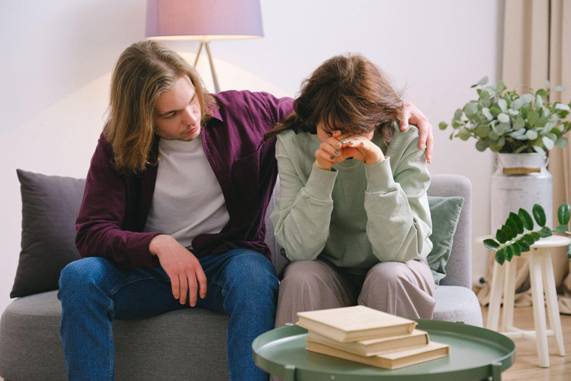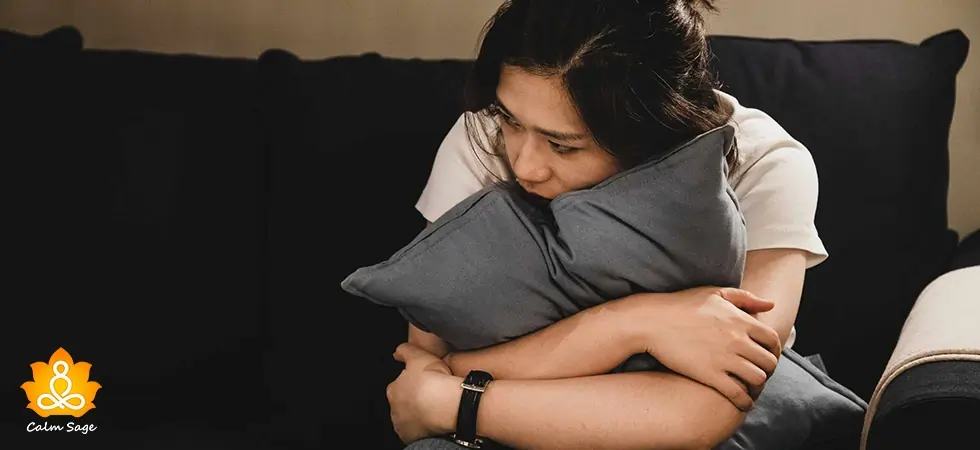PTSD And Relationships: Exploring the Effects of PTSD on Relationships

We can lean on relationships when we need social support and connection, and these people are who you care for and who care for you in return. When you throw in mental health or emotional health issues in relationships, it can make it difficult for you to connect with your loved ones. One of those issues that can be challenging to maintain a healthy relationship is PTSD or post-traumatic stress disorder.
PTSD is a severe mental health condition that is caused when you experience a life-changing traumatic event. It can be harder to move on from said trauma and in a relationship, the effects can cause your loved one (or you) to withdraw, become unresponsive, or live in a state of hyper-alertness.
Living with PTSD, even if it’s your partner, does not mean that you have to give up on maintaining connections. Learning the right communication tools, and healthy coping strategies, and knowing that help is available can help you keep a healthy relationship.
In this blog, let’s explore the link between PTSD and relationships by understanding the effects PTSD can have on relationships.
The Effects of PTSD on Relationships

Having PTSD or not doesn’t define the kind of relationship you’ll have or are bound to have. However, having and living with PTSD symptoms may impact your relationship. Sometimes, the effects of PTSD are clear to see while other times, they are not even noticeable or you may not even be aware of them.
All kinds of relationships – personal, workplace, or even social – can be affected by PTSD symptoms. Some of the common effects of PTSD on relationships can include intimacy, communication, avoidance, attachment, etc. Let’s take a look at how PTSD can affect your relationships in more detail;
Intimacy
The closeness you have with your partner or friend in the relationship defines your intimacy. Intimacy can be emotional, physical, or sexual, but depending on your relationship, the closeness can be affected. If you feel that your PTSD symptoms are affecting the intimacy in relationships, then watch out for these signs;
- Lack of interest in pleasurable activities
- Having a negative self-image
- Experiencing feelings of detachment from others (emotional or physical)
- Having a fear of intimacy
Sexual Intimacy
PTSD can also affect your sexual intimacy in a romantic relationship, especially if the PTSD trigger has been sexual abuse or any kind of sex-related trauma. This trauma or post-trauma can make it difficult for you to connect with your partner or feel safe in a sexual relationship.
However, there are cases when trauma may also result in hypersexuality, a condition in which you develop compulsive sexual habits that can be hard to control.
Communication
One of the many aspects of a relationship that is affected by PTSD is communication. You may find it harder to communicate your needs or wants with your partner. This may result in a weakened bond or relationship. PTSD Symptoms can also manifest as irritability, frustration, fear, resentment, and even random emotional outbursts.
The presence of these emotions can make it harder for you to healthily communicate with your loved one and further increase the risks of conflicts and misunderstandings. In the end, even the smallest disagreement may make you feel anxious and overwhelmed.
Avoidance
PTSD can be caused by a traumatic event that you have experienced and have no control over. This can make you feel triggered by certain situations and events, and even cause you to avoid talking about certain topics.
Because of this, it can cause you to avoid activities, people, places, and events that may remind you of your traumatic experiences and instead withdraw into yourself, increasing your avoidance.
Attachment Issues
In any relationship, we need to feel emotionally connected with our loved ones so that we feel safe to lean on them when we need social support. PTSD can cause you to experience detachment from people, situations, and even oneself. Because of this detachment, you may push away your loved ones and retreat into yourself to protect what’s left of yourself.
In other situations, PTSD can cause you to experience dependency where you feel like you need to be taken care of by others or protect your loved ones. You may even resort to actions such as becoming demanding, smothering, or depending on others for your needs.
When Your Partner Has PTSD

When you live with someone with PTSD, their symptoms and behaviors can affect your well-being and health. If you live with someone who has PTSD, the first thing you need to do is understand the disorder and how its symptoms affect them and you. Knowing what to expect can help you mitigate the effects.
If you see your loved one acting differently, it can cause you to have an emotional reaction. It’s common and natural to feel this way, so it’s OK. You might also experience the following emotions when you live with a partner with PTSD;
- Feelings of fear and worry: Living with a partner with PTSD can put you on the receiving end of their frustrations and fear, causing you to respond with fear and worry. You may even feel, at times, that you’re walking on eggshells around them. Your partner with PTSD may also become unpredictable, making you live in anxiety.
- Avoidance: Because of their unpredictable behavior, you may find yourself avoiding certain topics and actions. It may ultimately take a toll on your mental and emotional health.
- Feelings of guilt and shame: Even though these emotions may feel out of place, you may still feel guilt and shame when you live with a partner with PTSD. You might take the blame that you couldn’t prevent the trauma from affecting your loved one or feel that you are not the one feeling the effects but your partner is.
- Anger: Again, anger is a common response to feel and experience when you have a partner with PTSD. You may feel angry that the responsibilities of the family and relationship are on you or that you can’t take care of your loved one. You may also feel overwhelmed and that may cause you to experience emotional outbursts.
- Increased sleep issues: Many reasons can cause sleep problems including the state of chronic stress you’re now living in. Your sleep issues could also be a response to your partner’s sleep issues or you may feel disconnected from your partner when they are not next to you. All of these situations can cause you to lie awake in your bed at night, worrying.
How to Help Someone With PTSD?
If your loved one is living with PTSD and if it’s causing you to live in fear and constant worrying, then here’s how you can support your loved one;
- Encourage them to seek professional help and support
- Learn techniques to help your loved one with their symptoms such as breathing techniques, focus, or grounding techniques
- Keep a routine to help them feel safe as much as possible
- Allow your loved ones to make their own decisions. You can stand by and support them but avoid making decisions on their behalf
- Learn to control and manage your stress levels by focusing on your self-care as well
- To help support your partner or loved one, you can seek mental help for yourself
- Be there for them when they share something difficult for them to talk about. Make sure your reaction to their sharing is as positive as possible
- Share your love and support with your partner as openly as you can
- Ask them how you can help them or what they need from you in times of need
- Remain calm and patient when your partner or loved one is going through something emotional
- Give yourself and your loved one space when things become too overwhelmed to handle
- Avoid downplaying your loved one’s trauma
With the right help and treatment, PTSD can be manageable. Know that you can’t force your loved one to seek help, but you can encourage them. Allow them to make their own choices and avoid steering their life for them. Just try to be there for them and show compassion, kindness, and love for what they’ve been through and experienced.
What Next?

Living with PTSD can not only affect your health but also your relationships. With the right support, coping strategies, and treatment, PTSD can be manageable. If you or your loved one is living with PTSD, then you can consider reaching out to a professional for help and support. Please know that help is available.

Great for a large network of licensed therapists
-
$60 to $90/week, billed every 4 weeks
-
Therapy via messaging, phone, or live video chat
-
Flexible cancellation at any time
20% off your first month

Great for CBT Based therapists
-
$40/week, billed every 4 weeks
-
Therapy via messaging, phone, or live video chat
-
Specialization for CBT based Therapy
20% off your first month

Best for Treatment Plants
-
$60 to $90/week, billed every 4 weeks
-
Therapy via messaging, phone, or live video chat
-
Flexible cancellation at any time
$100 off your first month with code SPACE
June is PTSD Awareness Month and in honor of the same, Calm Sage is working one step at a time to spread awareness and education on not just trauma and post-traumatic stress but also the disorders that often occur with PTSD such as depressive disorders, anxiety disorders, and more.
You are not alone! We’re here for you to support you in your recovery journey!
Take Care and Be Safe!




















